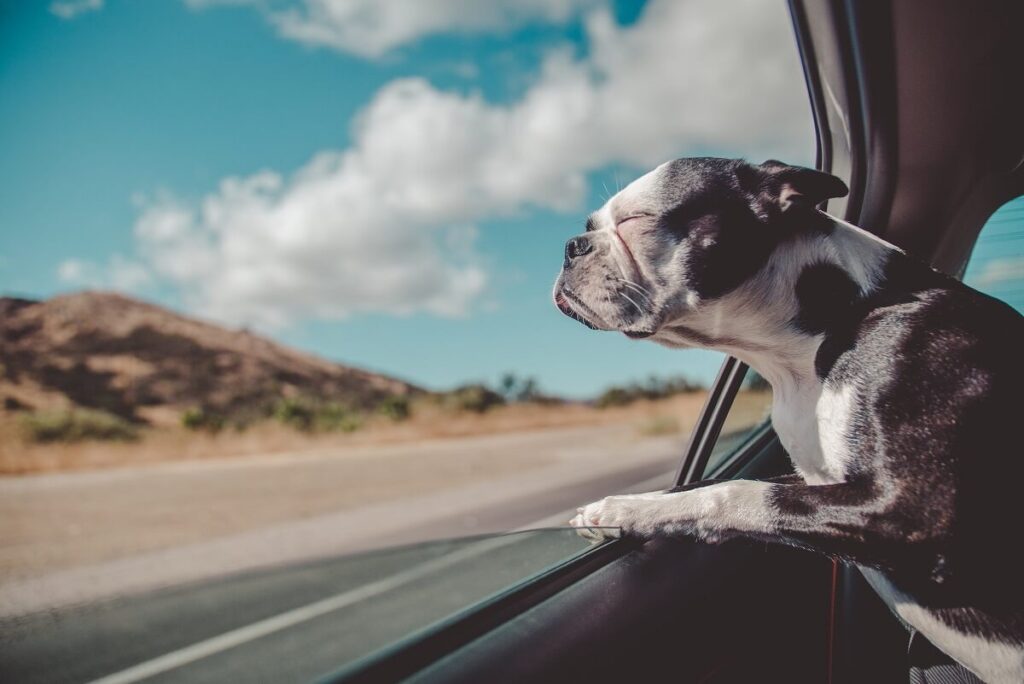Going on an adventurous road trip can be fun and exciting for many dogs. Unfortunately, not for all! Traveling, apart from a tiresome experience for pets, sometimes induced motion sickness in many pets. Car travel for dogs that are prone to motion sickness or anxiety, is anything but pleasant. To make the journey comfortable and enjoyable for your canine fellow, dig deep into the following measures and treatments, and prevent dog car sickness.
Cause of Motion Sickness
In general, conflicting sensory signals that are sent to the emetic (vomiting) center in the brain cause motion sickness. The conflict results between the signals emanating from the vestibules in the inner ear (responsible for balance) and the eyes.
Any negative association with the car, previous traumatic experience, fear, and anxiety can also induce dog car sickness. Puppies are more prone to motion sickness than adult dogs. It is because their vestibular system is not fully developed. Usually, their anxiety and fear for any type of travel lessen with age.
Symptoms of Motion Sickness
Watch for the following potential symptoms in case your dog is prone to motion sickness:
- Excessive lip licking
- Whining
- Drooling
- Yawning
- Vomiting
- Excessive panting
- Trembling/shaking
- Hunched back or other changed body posture
- Lips pulled back and tight facial muscles
- Wide eyes
- Trembling/shaking
If your dog experiences any of these, immediately take a break from the ride and treat him following the measures mentioned in this article.
Preventing Dog Car Sickness
1. Desensitization and Counterconditioning
You can prevent dog car sickness in the best way by right travel training. It helps your dog get used to car travel gradually. Start by just letting your dog in the resting car. Reward him whenever he gets in there. Place their crate, stuffed with your t-shirt and dog toys, in the car. Once he is desensitized to the car, start the travel training with short trips. Then, gradually increase the length of trips. During the trips, take frequent breaks. Try to associate positive experiences with your car. It helps your dog overcome the fear and anxiety associated with car rides.
2. Change Feeding Schedules
Avoid feeding your dog right before you start the journey. You should feed the dog at least 3-12 hours before traveling. It greatly helps prevent motion sickness in dogs. If you have fed your dog a few hours before traveling, make sure you take him for a walk. It will assist in the rapid digestion of food. Try to take frequent breaks from the journey and let your dog out to enjoy the fresh air.
3. Make The Car Comfortable
Dog car sickness can be prevented by making the car comfortable for your dog. Keep the dog in place either using a seat belt or a carrier. A dog carrier or crate not only keeps the dog in place but also adds to his comfort. You should keep the car ventilated and cool. Lower the windows slightly to equalize pressure in the car. A too hot or cold environment may induce motion sickness if your dog is sensitive. Loud noises can also induce dog car sickness. Therefore, avoid playing loud music in the car. Try to take a road that is less busy or noisy.
4. Use of Scents and Pheromones
You should include a sweet scent of home in the car to make your dog cozy and comfortable. You can place any item like a T-shirt or a blanket in a dogs’ carrier. Aromatherapy, lavender, and pheromones can calm stressed-out dogs. Add these scents to your dog’s bedding in the car. It is effective in preventing dog car sickness efficiently. But before using any of these, talk to your vet as a precautionary measure.
5. Associate Travel with Toys and Treats
Dogs with motion sickness take time to adjust in the car. Therefore, place your dog’s favorite toys in the car or his crate. You can also associate some special toys with car travel. Always keep those toys in the car in a dog travel bag along with other pet accessories necessary for travel. Playing with the toys will keep him busy and consequently prevent motion sickness. It would be beneficial if you associate car travel with treats. Every time your dog gets in the car, reward him. It would make him comfortable with the car journeys, greatly preventing dogs’ motion sickness.
Treating Dog Car Sickness
1. Natural Remedies
For the treatment and prevention of dog travel sickness, you can use some of the following natural remedies.
- The most effective dog car sickness natural remedy is ginger.
- Peppermint is another herb that calms the muscles in your dog’s stomach. Both ginger and peppermint can help ease nausea, vomiting, and flatulence in dogs.
- You can also use Catnip, Dill, or Fennel to help with your dog’s upset stomach. Due to its sedative effects, catnip keeps the dogs’ nerves calm and helps them relax.
- Cannabidiol (CBD) oil from cannabis and hemp plants, is an effective remedy for an upset stomach. It also comes with the added benefit of easing anxiety.
- But before trying out any of these dog car sickness natural remedies, consult your vet.
- Bach® flower (Rescue Remedy®), kava, valerian, passionflower, ginger, and skullcap are also effective as dog car sickness natural remedies.
- Lavender and its oil are an essential part of aromatherapy for dogs’ travel sickness. You can spray it in the car before traveling. Dip a cotton ball in lavender essential oil and place it in the car. Make sure to put the cotton ball out of reach of your dog. Homeopathic Treatment
Homeopathy proves to be another effective treatment for dog car sickness. Some of the great choices include; Wux Vomica, Sepia, Cocculus Indicus, Tabacum, and Argentum Nitricum. Give these medicines in 6-30C potency, 1-30 minutes before car travel or as per instructions by your vet. Homeopathic remedies do not work by bodyweight so give the drops as prescribed.
2. Supplements
Artificial calming supplements are designed to calm dogs when given orally. These are given over days before travel to gain maximum advantage. Such calming supplements come with the advantage of only a few minor side effects. Thus, you can prefer these over pharmaceutical medicines. CBD Supplements are another great option for motion sickness in dogs. It is widely available in many forms, including chews, treats, and oil. Always consult your vet for more reliable options.
3. Pharmaceutical Medicine
Pharmaceutical options should be acquired only if your dog has severe car sickness. Licensed anti-sickness medicine is used only for a short period, usually just before you plan the trip. Common anti-nausea medicines include Dramamine (Dimenhydrinate), Benadryl (Diphenhydramine), Cerenia (Maropitant), and Meclizine (Bonine, Antivert).
Anti-anxiety medicine is used for dogs who are extremely stressed out. Otherwise, these are generally not necessary. Some common anti-anxiety medicines include Alprazolam (Xanax, Trazodone, Desyrel). It is suggested to give these medications about 12 hours before the trip. Repeat 12 hours later just 2-3 hours before you start the journey.
Final Thoughts
We hope with this article you have found helpful measures to prevent and treat dog car sickness. In the case of medicinal treatment, it is highly recommended to consult the vet for a proper prescription of such medicine. Positive reinforcement and dog travel training would also prove to be of great value in overcoming the anxiety and fear associated with car travel in dogs.





